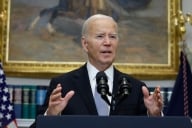You have /5 articles left.
Sign up for a free account or log in.
As colleges across the country prepare to launch a new academic year, our normal anticipatory excitement is tempered by the cascading consequences of the prolonged recession. At the same time that mushrooming financial exigencies have forced colleges and universities to shrink budgets and temper their ambitions, at least temporarily, the economic turmoil has savaged our sense of order and predictability. “Uncertainty sometimes seems our only certainty,” President Drew Faust of Harvard told alumni in February. She added that “discipline and sacrifice” will be required to weather the financial crisis.
Indeed, for many of us, the exhilaration of certainty has given way to the weariness of worry; optimism has been overcome by doubt. It’s no wonder we feel bereft, even dazed and confused. Where are we headed? How can we regain our bearings?
Such questions recall the Buddhist story about a man on horseback galloping past a monk. “Where are you going?” yells the monk. The man replies, “I don’t know -- ask my horse.” In recent months we too have often felt that we’re riding on a runaway horse. We struggle to sort things out, to understand the complex causes of our sufferings. Yet uncertainty prevails -- even among the supposed financial experts. Who knows what the next six months or two years will bring?
It’s quite natural for people to feel perplexed -- and perhaps even paralyzed -- by the extraordinary circumstances that have converged to disorient and dishearten us. Despair is the absence of hope, and many people are despairing.
But despair will not get us very far -- just ask Chicago Cubs fans. Yes, lamentation has its place, but it’s not enough to bemoan our situation: we need to move forward. Trauma can be a great teacher. The economic crisis is beginning to reveal fresh opportunities to those bold and creative enough to seize them. For example, there is already considerable discussion taking place about compressing the typical undergraduate college experience into three years rather than four. The imperative need to reduce expenses, reassess priorities, and generate new sources of revenue will be healthy to the extent that our colleges emerge from this latest fiscal crisis leaner and more nimble.
Retrenchment, in other words, can lead to unexpected advances. Consider, for example, the panache displayed by the World War I French officer who reported to headquarters during the Battle of the Marne: “My center is giving way, my right is in retreat. Situation excellent, I am attacking.” Today, however, our enemy is more elusive. It’s not so much an advancing army as it is a stalemating fear. How do we deal with the unknown depth and duration of our economic malaise?
One option is to do nothing, to wait for clarity and direction. Another is to lash out against the people and forces that have caused the financial meltdown. A more constructive choice is to acknowledge that life sometimes poses mysteries to be embraced rather than problems to be solved. At times we attack uncertainty by leveraging the power of the unknown, as often occurs in the martial arts. On other occasions, we confront the unknown in an effort to absorb its energies. Out of the roiling darkness may come beneficial light. That is the theme of a provocative book with an intriguing title by the cultural essayist Rebecca Solnit. It's called “A Field Guide to Getting Lost.” The book’s lucid, lean narrative trumpets the counterintuitive notion that we occasionally benefit from being lost.
To never to have been lost, Solnit says, is never to have lived. Echoing the Jewish tradition at Passover of leaving a door open overnight for the prophet Elijah to visit, Solnit urges us to “Leave the door open for the unknown, the door into the dark. That’s where the most important things come from, where you yourself came from, and where you will go [in the end].” Solnit reminds us that it is important to remain open to chance and the unknown, for it is only by relinquishing certainty that we approach the divine.
There is, in other words, great value in exploring the unforeseen -- and in remaking ourselves in the process. The financial crisis has led all colleges to initiate or renew focused reassessments of their mission, their structure, their vision, and their constraints. Such exercises on many campuses have become more participatory because of the seriousness of the situation. That is a good thing. All campus constituents have both a direct stake in the dialogue and vital contributions to make to it; only a shared sense of responsibility -- and an unconventional willingness to reassess priorities and examine all options -- will enable many colleges to weather the storm and emerge even stronger by sharpening their focus. At Cornell University, for examples, 20 task forces have been created to “reimagine Cornell.” As Provost Kent Fuchs recently acknowledged, the streamlining process may have been prompted by budget cutbacks, but it has become an opportunity for institutional improvement: “It’s very scary, but there is a lot of freedom to think creatively.”
At Cornell as well as many other campuses, people are asking truly strategic questions: Can unnecessary or mediocre programs and activities be cut back or cut out? What innovations might be spurred by the crisis? In other words, frugality and caution are not enough. The disorienting exigencies of the recession will be truly beneficial to the extent that they embolden campus communities to make hard decisions and consider fresh ideas and approaches that have been postponed too long.
While economic chaos and confusion beckons, clarity awaits those colleges and universities that transform the financial crisis into a catalyst for creativity -- and courage. By tapping the energies of shared sacrifice and the opportunities for revitalized innovation, campus communities can harness uncertainty and redirect its inertia. Somewhere amid the murkiness of our economic dilemma lies the opportunity for new discoveries, clarifying insights, and the impetus for streamlined performance. As Winston Churchill observed, “A pessimist sees the difficulty in every opportunity; an optimist sees the opportunity in every difficulty.”
So let us resolve to traverse the unmapped territory of our future not with gloomy foreboding or unspoken terror or vengeful rage but with eager anticipation for what good and unexpected things might emerge from the unknown and unfamiliar. By embracing the mystery of uncertainty, we will find its own forms of beauty and energy and coherence -- and we will discover in ourselves the ironic capacity to be renewed and even transformed by the shock of insecurity.








